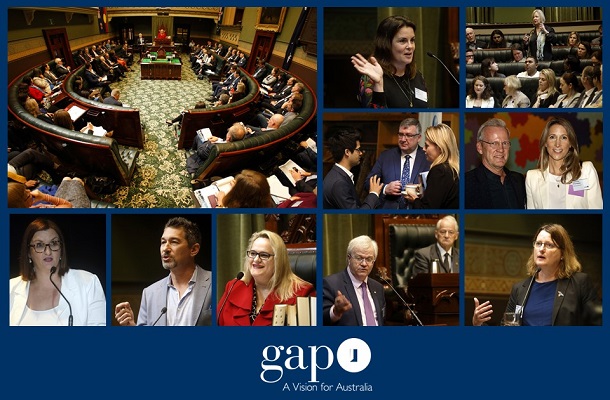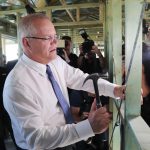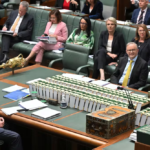GAP in 2019 – A year in review

As 2019 draws to a close, we reflect on those events and achievements that made it meaningful. I’d like to thank you all for your valuable contributions and unwavering support during a year that was both challenging personally and uplifting professionally. Here are a few highlights from the year that was.
A Vision for Australia
Our Vision for Australia Summit celebrated its 10th anniversary in September, and our passion for all things education focused our collective GAP member attention on lifelong learning. The Summit considered issues in early childhood learning, school and tertiary and vocational studies, all the way to upskilling and reskilling in later life.
Just a few years ago, this agenda might have seemed too broad, but it makes perfect sense now that the concept of lifelong learning has become more mainstream, careers are more fluid, educators are more willing to work across sectors, and Australians appreciate the need to develop skills throughout their lives.
The Summit’s opening dinner saw the launch of the ‘Bridges to the Future’ report by the 2018/19 Youth Transitions taskforce, our formal contribution to the NSW Curriculum Review. The report was also presented to the federal Minster for Education, the Hon. Dan Tehan MP. We identified career advice in schools as a key area for development, and will start a taskforce on Career Education in early 2020.
We continued to promote the importance of early learning to improve the outcomes of children in disadvantaged families, and will be launching the next phase of our Early Childhood Education initiative in the new year with support from the Victorian Department of Education and Training and other partners.
Pacific Connect
Our Pacific networks continue to grow, and we are proud to be part of Pacific Connect and to contribute to Australia’s Pacific Step-up policy.
We continued to support the International Centre for Democratic Partnerships (ICDP) in building interpersonal links with our closest neighbours through dialogues in Brisbane, Suva and Honiara, and co-hosted the Pacific Connect Ideas Exchange in Sydney in September.
I am delighted to announce that the government has extended funding for Pacific Connect for another three years!
The Second Track
We are promoting the value and effectiveness of our Second Track process as a tool to tackle complex problems through our new Journal of Behavioural Economics and Social Systems (BESS).
The Journal will explore the theory underpinning the practice of the Second Track and broaden recognition of the methodology to encourage its wider adoption. We would welcome your contributions to the next edition, due in May 2020!
We published a new book on innovation co-authored by Peter Fritz AM and Brad Howarth. Innovation is for Everyone has been three years in the making, and is a culmination of conversations with leading thinkers from the realms of politics, academia, business and government.
As the authors say, no one group can shoulder the burden of lifting Australia’s innovation performance alone – if it’s in everyone’s interest for our country to become more innovative, then everyone has a part to play.
Health
The final report of our Health 2040 group hit the media in August, outlining 19 reforms which would ensure a more sustainable health system in twenty years’ time.
This taskforce showed the ability of the Second Track to foster positive discussions between groups with different interests on sensitive issues, and pursue reform both in public policy and within their own organisations. A second phase of the Health 2040 project will work on implementing their proposals in 2020.
Productive Ageing
We maintained the momentum on productive ageing for a fifth consecutive year, and co-hosted a roundtable on mature-age employment for SMEs in June. The discussion focused on best-practice policies in large employers, with presentations from Bunnings and Australia Post.
We are proud of our ongoing partnership with the NSW Department of Communities and Justice and appreciate their commitment to tackling the challenges posed by an ageing population. Our next roundtable in 2020 will develop actions to progress age diversity in the workforce.
Media
Given rising public concern over media misinformation, we launched our Media Taskforce in October to bring together a coalition of journalists, policy makers, educators, technology experts and philanthropists willing to fight for the quality of public discourse.
The Environment
After more than a decade of relentless efforts by our National Standing Committee on Energy and the Environment members to promote biological sequestration of carbon, we celebrated the release of Australia’s first carbon credit units to a soil carbon project in March. These credits were the first to count towards our national targets under the Paris Agreement on mitigating climate change.
Remembering Warwick Watkins
2019 will also be remembered for the passing of our friend and colleague Warwick Watkins after a long battle with cancer. Warwick made invaluable contributions to GAP over two decades as chair, founding partner, facilitator and co-author of projects in knowledge capital, cybersecurity, digital trade and energy reform. He will be deeply missed by us all.
The Year Ahead
Our programme for 2020 includes new projects in artificial intelligence, national security and human progress, and we look forward to our ongoing initiatives growing and evolving in positive and unpredictable ways.
We also continue our quest for new ideas and projects, and would welcome your suggestions. The GAP team looks forward to working with you to turn your ideas into reality, but for now warm wishes for the holiday season and a Happy New Year.

Catherine Fritz-Kalish is the co-founder and Managing Director of Global Access Partners (GAP) and Director of the International Centre for Democratic Partnerships (ICDP) and ICDP Foundation. She also holds Board positions for a number of not-for-profit organisations.















Amelia Anderson
December 19, 2019 at 8:29 am
Judging by this blog and its various reports, GAP seems to be a think tank for the ‘radical centre’ – a political philosophy dating back in name to the late 60’s, and in essence well before that.
There’s several other think tanks around the world ploughing the same furrow – Demos in Britain and New America in the USA come to mind – and while GAP doesn’t call itself a think tank or align with the radical centre, I think it’s the Australian equivalent of its better known Anglosphere cousins, recruiting adhoc groups of unpaid individuals from stakeholder groups to generate its ideas, as it lacks the resources to generate its own.
The radical centre believes that real reform is required across society, rather than mere ‘knob twiddling’ and futile injections of cash, but that new ideas must be pragmatic and practical to succeed in the real world as well as theoretically creative.
Devotees try to judge ideas on their merit, rather than their ideological origins, and while these proposals are often ‘outside the box’ of conventional thinking, they stay rooted in the reality of human nature. As John Avlon noted “Idealism without realism is impotent” but “realism without idealism is empty.”
Various people around the world have produced radical centrist proposals on agriculture, energy, education, health, international relations, red-tape, political debate and a dozen other things in the last few decades, just as GAP has done, although many of these thought leaders would not label themselves as ‘radical centrists’.
While these ideas cover many issues, they tend to preach a similar mix of innovative market solutions with strong public controls for ‘wicked problems’ and stress the central need for better education for all, tempered with strong financial responsibility.
Whatever the origin of these proposals, radical centrists around the world also agree that sensible individuals in motivated groups also have a duty to take them to decision makers and put them into action to make a difference.
All this is very well meaning, but this approach tends to falter in two party systems which inevitably polarise between left and right. Sensible centre parties get squeezed out of existence in the middle, particularly when times are tough.
Good ideas get everyone nodding their heads, but are quietly buried when they butt against the vested interests they aspire to dismantle. The temptation to remain all things to all people mean that tough decisions are avoided, and when they are made, half the membership will always cry betrayal.
The approach may succeed best when adopted by one of the perennial party blocks – such as Tony Blair’s New Labour or Bill Clinton’s Democrats – rather than inspire newly formed centre parties which grow, flower and die like mayflowers.
If not quite the Disraeli of our times, Boris Johnson may turn out to be the Tony Blair of the Conservative Party, a secret ‘radical centrist’ whose restless, ebullient personality makes him more naturally adventurous than the worthy but staid “One Nation” Tories of old.
Traditional parties – like Corbyn’s wretched Labour Party – are doomed if they remain huddled down in the trenches dug during the early 20th century. However it’s not only the modern age of global trade and instant information that requires new approaches, people themselves have changed. We enjoy a much greater range of choice in personal mores as well as consumption, and look for more choice and imagination in our politics too.
We can ally our wish to improve the world with data led approaches which may actually work, as well as make us feel better about ourselves. The “effective altruism” movement, for example, is about finding the most efficient ways to use our resources to help others the most. Rather than just doing what has been done in the past or feels right today, its adherents use evidence and careful analysis to find the best causes to work on and encouraging people to act in practical ways with their time and money, rather than relying on others. Maybe GAP could help nurture this movement in this country?
People want the opportunity to participate in change as well as benefit – or be protected – from it, and proposals from the ‘radical centre’ which offer them this could gain the public support required for politicians to take action. GAP seems to lobby politicians behind the scenes, rather than fuel public debate, but informing and inspiring public debate could motivate more political interest.
Perhaps GAP might have more impact by courting controversy, rather than shying from it. Topics like freedom of speech – once the universally acknowledge bedrock of modern Western society – are now contentious, but without freedom of speech, society cannot raise, confront and solve the problems which face us and outcompete authoritarian states.
The freedom to say that two plus two equals four is being impinged upon from both sides of politics, and a generation is being raised to prize feelings over facts, relativism over enlightenment and identity grievance politics over individual endeavour and action. Taking a stand for liberty might mark GAP and Open Forum from the pack, and be a more productive approach than painting enforced obscurity as some kind of secret strength.